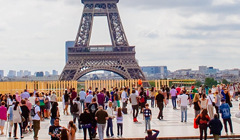Europe
23 Video
duration: 1 Hour and 15 Minute
Pandemic-free Montenegro is trying to attract tourists to its Adriatic coast
00:01:22
Video prices: 5 SAR weekly
Less than two months after its first infection was detected, Montenegro was the first country in Europe to declare itself free of the coronavirus, and it hopes to attract tourists to its picturesque Adriatic coast this summer. In the coastal areas of this small Balkan country, hotel employees have been combing sand on beaches deserted by visitors who usually flocked to them during the end of spring for weeks. However, hope has returned since the authorities announced that Montenegro has not recorded any new local cases of Covid-19 since May 5, and that it no longer includes any infections that are currently ongoing. "Safe destination" Prime Minister Dusko Marković said enthusiastically on Monday: “Let me take off my mask,” when announcing the good news in a country where tourism represents 20% of its gross domestic product and jobs. Markovic added: “As of today, Montenegro has become a special place, due to the results it has achieved in its battle against an invisible and unknown enemy.” Tourism companies seized the opportunity, publishing pictures of the turquoise waters and stunning mountain views of this first European tourist destination free of Corona. "Safety is what people want most," Ana Nevesh Radovic, director of the Kotor Tourist Association, told AFP. This medieval tourist city, listed on the UNESCO heritage list, represents an essential destination for lovers of recreational sea trips, and it also boasts that it has not recorded any infection with the new Corona virus. Since the first infection with the virus ten weeks ago, the number of infections in this country of 630,000 people has not exceeded 300 infections and nine deaths. Strict hygiene procedures Radovic emphasizes that people want a destination where they feel safe, with the certainty that nothing bad will happen to them. Natasha Spiric-Smiljanic, the owner of two hotels overlooking picturesque bays, points out the adoption of strict hygiene measures, in an attempt to re-attract the French customers who usually flock to the place. Natasha told Agence France-Presse: “We are prepared in terms of hygiene, and we have set new standards and have the required space” to impose social distancing rules, but she points out that there are no great hopes for a significant increase in attendance. It indeed appears that the recovery in tourism traffic will be complicated, with the World Tourism Organization predicting a collapse of between 60% and 80% in the number of international tourists. Ambiguity still prevails regarding the conditions for reopening borders in Europe during the quarantine phase, as well as regarding the resumption of air traffic. Montenegro is expected to attract much fewer tourists than last year, which amounted to 2.6 million, more than four times the population. In a first phase, Montenegro will only open its doors to tourists coming from countries classified as safe, that is, those with fewer than 25 infections per 100,000 inhabitants. While these conditions apply to Croatians, Austrians and Greeks, tourists from Britain and Russia, which constitute an important source of visitors to Montenegro, are not expected to return soon. Croatia is a “safe” second destination The manager of the luxurious Regent Porto Montenegro Hotel, Kay Dieckmann, says: “I am sure that our first wave of customers will be




